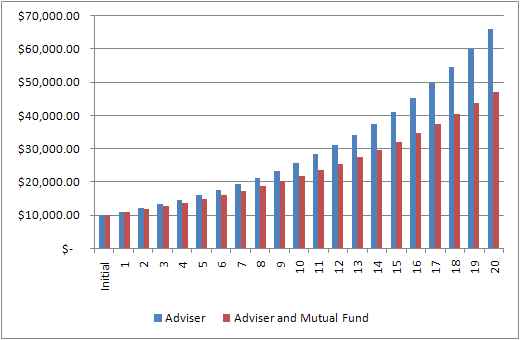Compare Us To Other Options
Before making investment decisions, compare us to mutual funds, other advisors, insurance plans, or doing it yourself.
MUTUAL FUNDS
Most mutual funds make money for one person, the fund manager. They have high costs and a long record of under-performance even in the short term. In 2008, the average domestic stock fund charged 1.66% and the average global stock fund charged 1.81%. Those figures do not include any sales charges, which would further increase the costs.
If you think those expenses are high, wait until you see what performance you got for those fees over the past five years:
- 66% of mutual funds underperformed their benchmark, meaning an investor would have been better off buying an index fund.
- 48% of mutual funds didn’t follow their stated investment strategy.
- 27% of mutual funds shut down or merged with other funds.
Over the long term the outlook for mutual funds is even grimmer. Over 30 years (the length a typical person invests for retirement) only 2.5% of domestic stock funds outperformed their benchmark.
OTHER ADVISORS
Most other traditional advisors charge 1% or more of your assets to place you in mutual funds. All mutual funds charge a fee. The combined total of fees can sometimes reach 3%. In addition most people who call themselves financial advisors, financial representatives, wealth managers, or financial planners are simply sales people. For example, advisors working for large banks or insurance companies are commissioned sales people who are usually biased in favor of the products of their institution.
The example below shows the growth of $10,000 over 20 years at 11%. The blue bars show the portfolio would be worth $65,942.21 if managed by an advisor who charges 1%. The red bars show that same investment if it was a mutual fund that charged the average of 1.66% percent and was managed by an advisor who charged 1%. The portfolio is only worth $47,181.04. An astounding $18,761.16 less!

While we cant promise you certain returns, we can promise to avoid known investing pitfalls and save you expensive fees.
INSURANCE PLANS
While many types of insurance are a good idea and are valid risk-mitigation tools, too often insurance policies are sold as an investment vehicle. Insurance companies have come up with clever ways to add investment-like properties to insurance policies, but they also add on layers of high fees.
DOING IT YOURSELF
If you have the proper disciple and knowledge, investing your money yourself is the most cost-effective method. There are many good books available to guide you on how to invest. If you develop a good plan, maintain a disciplined approach, and can stay the course throughout several down years, then by all means choose this option. If, however, you’d like some professional help give us a call.
